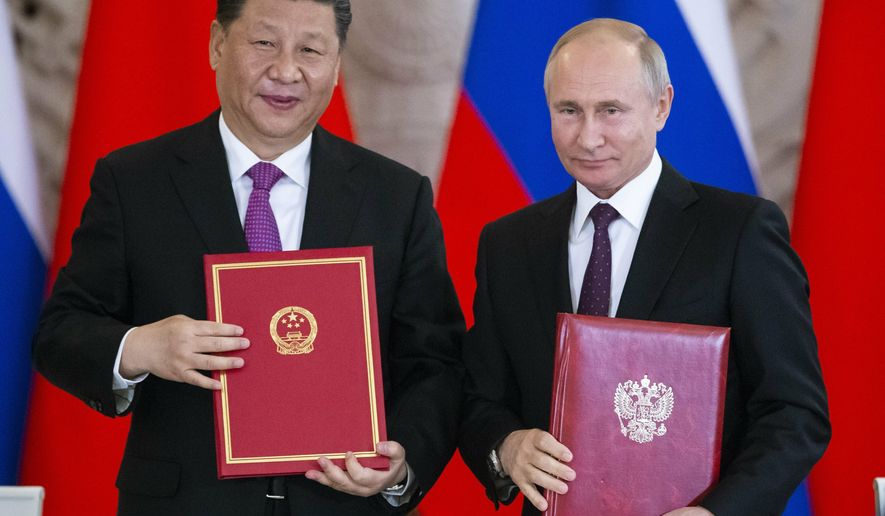OPINION:
Russia’s Defense Ministry has announced the Chinese People’s Liberation Army will join Russia and six other nations for Tsentr 2019, a massive, five-day military exercise involving over 100,000 troops that starts Monday. Just last year, Russia and China joined in the Vostok military exercise with over 300,000 troops in Siberia training jointly near the Chinese border.
The exercises are the clearest evidence to date of how Russian-Chinese relations have grown increasingly close since the Sino-Soviet split in 1961, when Moscow and Beijing were competing for control of the communist world. Having significantly expanded their economic, military and diplomatic ties, both countries see value in an alliance against their common enemy — the United States.
Russia and China are seeking to conflate an unreal and exaggerated Western military threat with what really threatens the regimes of President Vladimir Putin and Chinese counterpart Xi Jinping: the values and principles, including democracy, freedom and liberty, enshrined in the Constitution and Bill of Rights.
After declaring a “constructive partnership” in 1992, and a “strategic partnership” in 1996, Russia and China signed a treaty of “friendship and cooperation” in 2001. The two countries created the Shanghai Cooperation Organization that year specifically to counter the U.S. in Central Asia.
China is now suffering from its trade war with the Trump administration. American and European sanctions on Moscow for its seizure of Crimea have taken their toll on Russia’s economy as well. China and Russia are naturally growing their bilateral economic relationship as a counterbalance.
China is a major purchaser of Russian military equipment, which has been critical to modernizing the PLA. China also relies on Russia’s vast oil and natural gas reserves. Trade between the two countries is projected to rise to $200 billion by 2020.
The U.S. 2018 National Defense Strategy concluded that China and Russia, as “revisionist powers,” are seeking to shape a world “consistent with their authoritarian mode.” The two countries, the document argues, represent the preeminent threat to U.S. national security today.
Beijing’s military aggression in the South China Sea infringes on the freedom of navigation in the region as well as the rights of Vietnam, Taiwan and the Philippines. The Xi government has also mounted extensive espionage operations, allegedly hacking the Office of Personnel Management to steal U.S. government employee data. According to FBI Director Christopher A. Wray, “from a counter-intelligence perspective, China represents the broadest and most challenging threat we face as a country.”
Counterfeit Chinese products steal U.S. trade secrets and intellectual property, Chinese market-access laws force U.S. companies to share valuable technology, and Mr. Xi’s “One Belt, One Road” financing program serves as a cover for a debt trap strategy allowing China to increase its economic throw-weight, military power and political influence from Asia to Africa.
U.S. relations with Russia are similarly at a nadir due to Mr. Putin’s aggressive and dangerous foreign policy. In the past decade, Russia invaded Georgia; violated Ukraine’s territorial integrity; downed a civilian airliner; was a co-conspirator in Syria’s and Iran’s attacks on civilians in Syria; poisoned a former Russian military intelligence officer living in Britain with a nerve agent; and interfered in elections in the U.S. and Europe.
Both regimes are seeking to control their people’s online access, China through its “Great Firewall” and Russia not far behind in seeking to impose sovereignty in its cyberspace. We are witnessing the rise of the Sino-Russian authoritarian internet, the antithesis of an open and free cyberspace which serves as a force multiplier for commerce and freedom of expression.
There are still some bilateral friction points, including China’s expansion in Central Asia and Russia’s warm relations with Beijing’s regional rivals, including India. But there is no opportunity for the U.S. to drive a wedge between them as President Nixon skillfully did in the early 1970s.
• Daniel N. Hoffman is a retired clandestine services officer and former chief of station with the Central Intelligence Agency. His combined 30 years of government service included high-level overseas and domestic positions at the CIA. He has been a Fox News contributor since May 2018. Follow him on Twitter @DanielHoffmanDC.




Please read our comment policy before commenting.